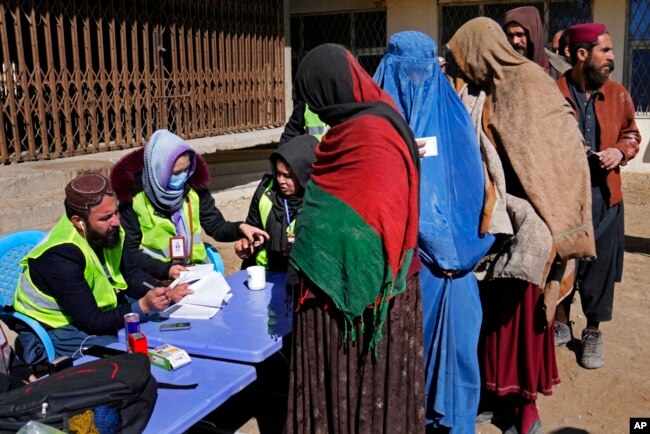WASHINGTON — Millions of people in Afghanistan are likely to have no food, healthcare or shelter this winter because of critical funding gaps, according to various experts who spoke with VOA.
“What is at stake in Afghanistan this winter is the lives of millions of starving women and children,” Jan Egeland, Secretary-General of the Norwegian Refugee Council, told VOA by email August 9.
Of Afghanistan’s estimated 38 million people, at least 15 million are in dire need of food assistance. But the World Food Program is able to assist only 5 million people in August with the possibility the food-aid lifeline could be terminated in coming months.
Funding shortfalls, Egeland said, also threaten essential healthcare services because aid agencies donate medicine and other critical resources to hospitals across the country.
More than 260 clinics reportedly went out of service in June, depriving 2 million people of healthcare.
If current funding needs remain unmet, 3.7 million people would lose access to essential and lifesaving health assistance, the United Nations has warned.
The U.N. has appealed for $3.26 billion in humanitarian funding for Afghanistan this year, but donors have given only about $800 million (less than 25% of the appeal) as of August 8.

The United States this year contributed $335.7 million to the appeal — the largest contribution in 2023 — but even this amount falls far below the $1.2 billion Washington contributed to the appeal last year.
The United Kingdom, Germany and Canada have also slashed their contributions to the appeal from $454 million, $444 million and $106 million last year to $23 million, $34 million and $28 million thus far this year, according to the United Nations.
Politics or fatigue?
Behind the decline in funding lies a complex interplay of politics, fatigue, and concerns about the Taliban’s repressive policies, chiefly the denial of education and work rights for Afghan women.
The Taliban’s restrictions on aid operations and their perceived diversion of funds for their own benefit have raised calls for greater transparency and even potential termination of aid for a Taliban-controlled Afghanistan.
Denying interference in humanitarian activities, Taliban officials accuse Western donors of politicizing humanitarian aid.
“We have never interfered in aid programs, but as a responsible authority we have advised that aid be delivered to the most deserving and needy communities,” said Suhail Shaheen, a Taliban spokesperson.
The politically isolated Taliban leadership faces international sanctions and many donor countries fund only the programs and activities that completely bypass Taliban authorities and regulations.
“The expected decline in humanitarian aid does not reflect Western donors’ political agendas, but rather aid fatigue after two years of extraordinary efforts to respond to the humanitarian crisis, as well as a global trend of declining aid worldwide,” said William Byrd, a senior researcher at the United States Institute of Peace.
Of the 43 humanitarian appeals the U.N. has launched this year asking for $55.2 billion in response to emergencies in different parts of the world, donors have given nearly $14 billion (25%) as of August.
Syria’s $5.4 billion appeal, Yemen’s $4.3 billion, Ethiopia’s $4 billion, and Ukraine’s $3.9 billion — the largest appeals — are respectively funded at 23%, 31%, 26% and 31%, according to U.N. figures.
‘Cold war’
As humanitarian funding and operations are added to the long list of differences between de facto Taliban authorities and donor countries, aid workers say they feel caught in the crossfire.
“We are stuck in the middle of this cold war as we attempt to stay true to principled humanitarian service provision,” said Egeland, adding that the Taliban and the foreign donors “have different criteria for how they define appropriate humanitarian programming.”
Despite facing sanctions and failing to earn formal recognition from any country as the legitimate government of Afghanistan, the Taliban have refused to give in to widespread domestic and international calls for respect for women’s rights and the formation of an inclusive government.
Cutting off aid, experts say, is unlikely to change things.
“I have never seen well-fed men with guns and power change their ways because we starve women and children,” said Egeland.
Extreme poverty, isolationism and unmitigated humanitarian crises could “create an environment ripe for radicalization and insurgency, potentially enabling extremist groups to exploit the situation,” said Samir Gawhary of Aseel, a tech startup that offers a humanitarian funding platform for Afghanistan.
“This could have implications for regional and global security,” Gawhary said.
Source : VOA News


